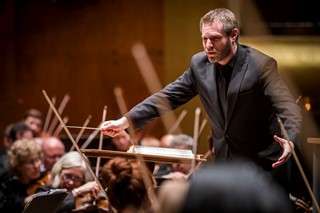|
Back
An auspicious debut New York
David Geffen Hall, Lincoln Center
02/09/2017 - & February 10, 11, 2017
Sergey Taneev: Oresteia, op. 6: Overture
Pyotr Ilyich Tchaikovsky: Francesca da Rimini, op. 32 – Symphony No. 6 in B minor, op. 64, “Pathétique”
New York Philharmonic, Joshua Gersen*/Semyon Bychkov (conductor)

J. Gersen (© New York Philharmonic/Chris Lee)
What is the similarity between the “cover” at any major opera house and the assistant conductor of any major symphony orchestra? The answer should be rather obvious and not difficult to guess: they both count on the “star” getting sick for their long-awaited chances.
Well, for Joshua Gersen, an Assistant Conductor of the New York Philharmonic, that chance came when Maestro Semyon Bychkov fell ill just hours before the start of Thursday evening’s performance, the last in a three-program series devoted to the works of Tchaikovsky. This final program was also going to offer a novelty: the New York Philharmonic premiere performance of Sergey Taneev’s Overture of Oresteia, Trilogy of Aeschylus. Mr. Gersen had just a few hours before the concert to look at the scores. As he admitted later in an interview (I am sure there was more than one!) he had never conducted the cinematic score of Francesca da Rimini and had never conducted the Philharmonic in the Tchaikovsky Symphony that at least he knew well.
I suppose when the announcement was made from the stage about the change of conductor I was not the only one in the audience whose thoughts went back to the night more than 70 years ago when the young assistant conductor Leonard Bernstein got his chance to conduct the Philharmonic when Bruno Walter fell ill.
This time the Oresteia Overture was eliminated from the program, and though Maestro Bychkov returned for the Saturday concert, the work which would have justified the idea of “Tchaikovsky in context” was never performed. I wouldn’t be surprised if the next time Mr. Gersen conducts his own subscription program – which we all wholeheartedly hope he will – he programs that work as an opener, just to relive the night when his real career was launched. Generally speaking, the thankless job of an assistant conductor is to be available to lead the orchestra without REALLY being given a chance. But Mr. Gersen is a known presence on New York stages since he has served as Music Director of the New York Youth Symphony since the 2012-2013 season. With his young charges he conducts three ambitious programs at Carnegie Hall each season. (The next one is Mar. 5.)
There seemed to be no hesitancy in Mr. Gersen’s approach to the episodic and cinematic score of Francesca da Rimini. He was sure-footed and deftly controlled the balances and sometimes glaring brass, presenting a compelling, convincing reading. It is a rambling score with what I personally I feel are Lisztian and Wagnerian influences, though I am not sure the Russian master was much influenced by his famous colleague pianist-composer-conductor also enamored by the poetry of Dante. What remains unquestionable in this longish work is Tchaikovsky’s gift for melody and tone-painting; here we have a gorgeous “love theme", drama, whirlwinds and rains. Like others in the audience I was wondering how much more coherent or subtle Semyon Bychkov’s reading might or might not have been. After all, the orchestra had already been rehearsed by him and probably gave its best to the young substitute. All the wind solos were beautifully sung and the ensemble was quite precise.
Much the same can be said about the exciting yet classically controlled version of the Symphony No. 6, which received a really first class performance. Bychkov doesn’t see this symphony as a resignation but rather as a protest against the death that comes much too soon. And that is perhaps why Bychkov’s – and as we’ve heard Gersen’s – concept of the tragic, depressing, funereal last Adagio lamentoso was slightly more clear-eyed than we traditionally hear, but that is also why I liked as much as I did. I always appreciate Tchaikovsky “with limited tears” and here it was at first potent and powerful, then accepting the departure from life with a dose of dignity. Earlier, our young conductor held his reins tight during the Scherzo, one of the most infectious, optimistic, buoyant and virtuosic moments in all of the composer’s output; it starts like feathery Mendelssohn but ends as loud, passionate and triumphal as any of Tchaikovsky most optimistic scores. It is very easy to rush the final pages and it is to Gersen’s credit that he has not given in to the excitement of the music.
His performances were received with a standing ovation. I think he owed much of the success of his debut to his colleagues from the orchestra, who also deserve much praise.
Roman Markowicz
|